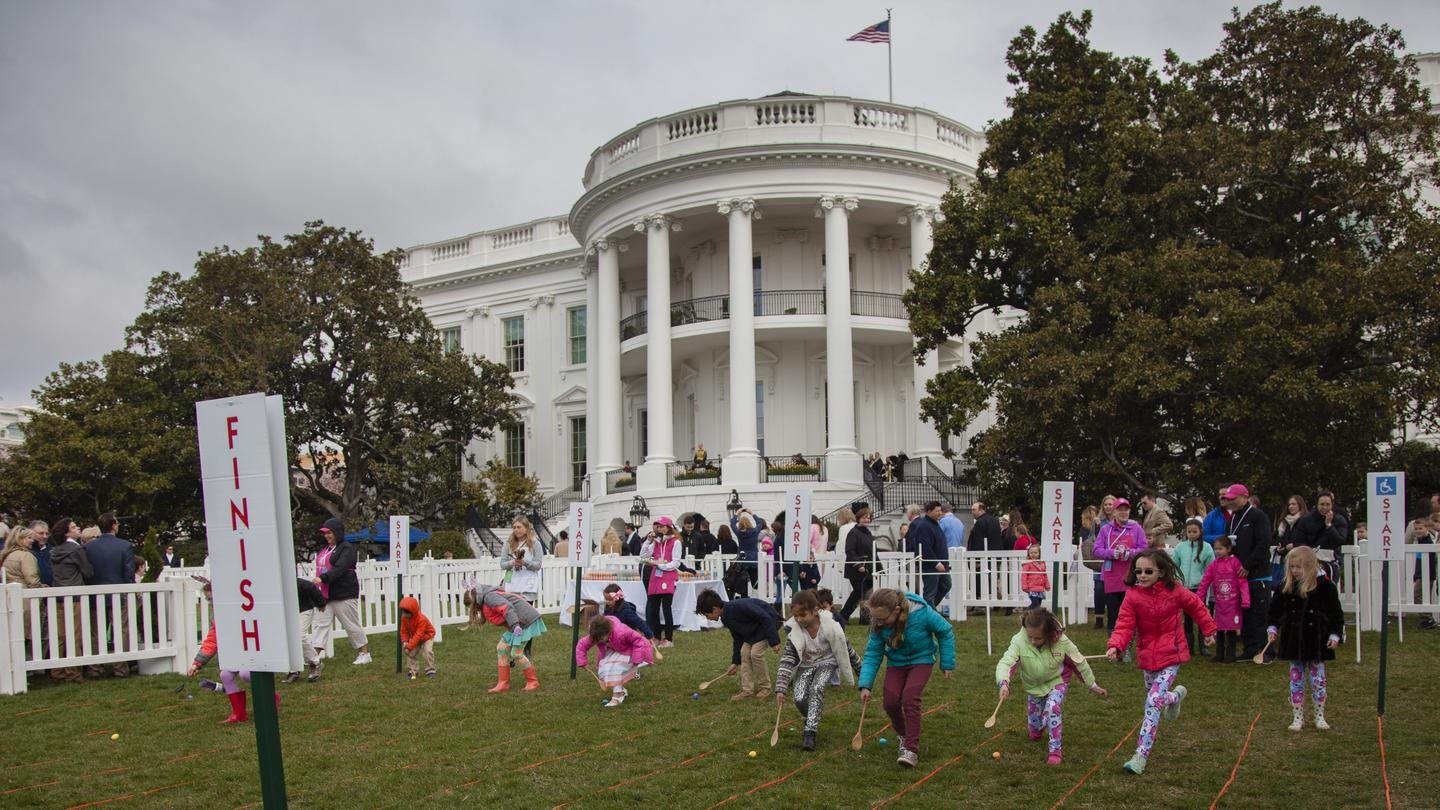
White House Easter Egg Roll for Sale
Last Monday, tens of thousands of kids and their parents once again engaged in the sweet madness of the White House Easter Egg Roll, a tradition dating back to 1878. But this year, there was something new: corporate sponsors. Amazon had its brand linked with a “reading nook.” The “Bunny Hop Stage” was sponsored by YouTube. Meta, the overlord of Facebook, Instagram and WhatsApp, underwrote an “AI-Powered Experience and Photo Opportunity.” Even the New York Stock Exchange got into the act, and what child could resist the chance to ring its bell?
Trump’s Poll Numbers Droop
It was another weird week in Washington, and not a particularly good one for Donald Trump. Like the eggs on the White House lawn, his poll numbers were rolling downhill. Pew reported his overall approval rating dropped to 40 percent, the lowest ever for a president this early in a term. A Fox poll drew the same conclusion, although with a rating of 44 percent.
More significantly, he’s taking a hit on one of the issues that likely got him elected again—the economy. A Reuters/Ipsos poll out Wednesday found that only 37 percent of Americans now approve of his handling of the economy—his lowest rating ever on the issue. And a new Gallup poll showed that a majority of Americans, for the first time since 2001, think their economic situation is getting worse.
Terrifying Tariff Trauma
There’s no question that Trump’s yoyoing on tariffs has taken a toll on his popularity, and it could only get worse if consumers start seeing empty shelves in stores, an unsettling situation that a group of retail CEOs warned Trump about earlier this week.
In March, about 40 percent of the product shipping containers arriving in the United States had come from China. But since the president’s self-proclaimed “Liberation Day” on April 2, when he announced tariffs on some 90 countries, bookings of Chinese ship containers have plummeted by more than 60 percent. Any shortages will be felt first on the West Coast starting in May, then across the rest of the country within another month.
All of which explains why we’re not hearing so much tough talk from the White House these days. Instead, Treasury Secretary Scott Bessent said there’s “an opportunity for a big deal” between the United States and China on trade issues, and the president said he was “going to be very nice” and that the final tariffs “will not be anywhere near” where they are now at 145 percent. Trump also said the two sides are “actively” talking. Wall Street liked that. But the Chinese government seemed to be operating in an alternate universe, stating that the notion of ongoing negotiations is a fantasy. Who to believe?
Buy Trump Crypto, Have Dinner with the Grifter-in-Chief
Sure, he’ll turn 79 in a few months, but Trump still knows how to do the Hustle. Not the dance. We’ve seen him dance. I’m talking about the White House Hustle. His latest performance came Wednesday with an online invitation for a chance to have “an intimate private dinner” with the president at his golf club in Virginia followed by a tour of the White House. But to qualify for this offer, you have to be one of the top 220 investors in $TRUMP, the president’s cryptocurrency. In other words, access to the president is being sold to people who buy a lot of his crypto coins. After the invitation went public, the price of $TRUMP coins jumped more than 60 percent.
Harvard Versus Trump. Who Will Screech First?
The president of the United States and Harvard University are playing billion-dollar chicken. There’s still a chance that they will work out some kind of deal. At the moment, though, the Trump administration is withholding $2.2 billion in grant money until the school falls into line, and Harvard is suing the feds to get them to back off. Trump countered with a threat to take away the university’s tax exempt status, which would make donations from alumni no longer tax deductible. Then more than 220 academics from universities and colleges around the country signed a letter condemning the government’s “political interference” and “overreach,” portraying it as an attack on academic freedom. But the faceoff remains a high risk to Harvard because Trump, as is his wont, holds the money card. Research projects at the university already have ground to a halt, including one to develop a diagnostic tool for amyotrophic lateral sclerosis (known by its acronym ALS or Lou Gehrig’s disease) and another on space travel and radiation sickness.
Measuring Climate Change’s Cost Company by Company
In a paper published in the journal Nature this week, two scientists presented a new tool to measure the cost of a specific fossil fuel company’s contributions to the climate crisis. They found, for example, that emissions attributed to Chevron—the highest-emitting investor-owned company in their database—very likely caused between $791 billion and $3.6 trillion in heat-related losses from 1991 through 2020.
The model developed by the two scientists—Dartmouth Associate Professor Justin Mankin and Stanford postdoctoral researcher Chris Callahan—focuses on harm reflected in economic growth data, including crop losses and lower worker productivity, and is based on decades of “attribution science” studies.
All told, Mankin and Callahan estimate that carbon emissions from 111 fossil fuel companies over the 30-year period they reviewed caused $28 trillion in damage from extreme heat. Their analysis should provide more ammunition for the hundreds of lawsuits around the world against oil and gas companies seeking compensation for climate damages and the cost of adaptation.
Randy Rieland is a former columnist at Smithsonian magazine, website director at the Discovery Channel, and senior writer at Washingtonian magazine.






